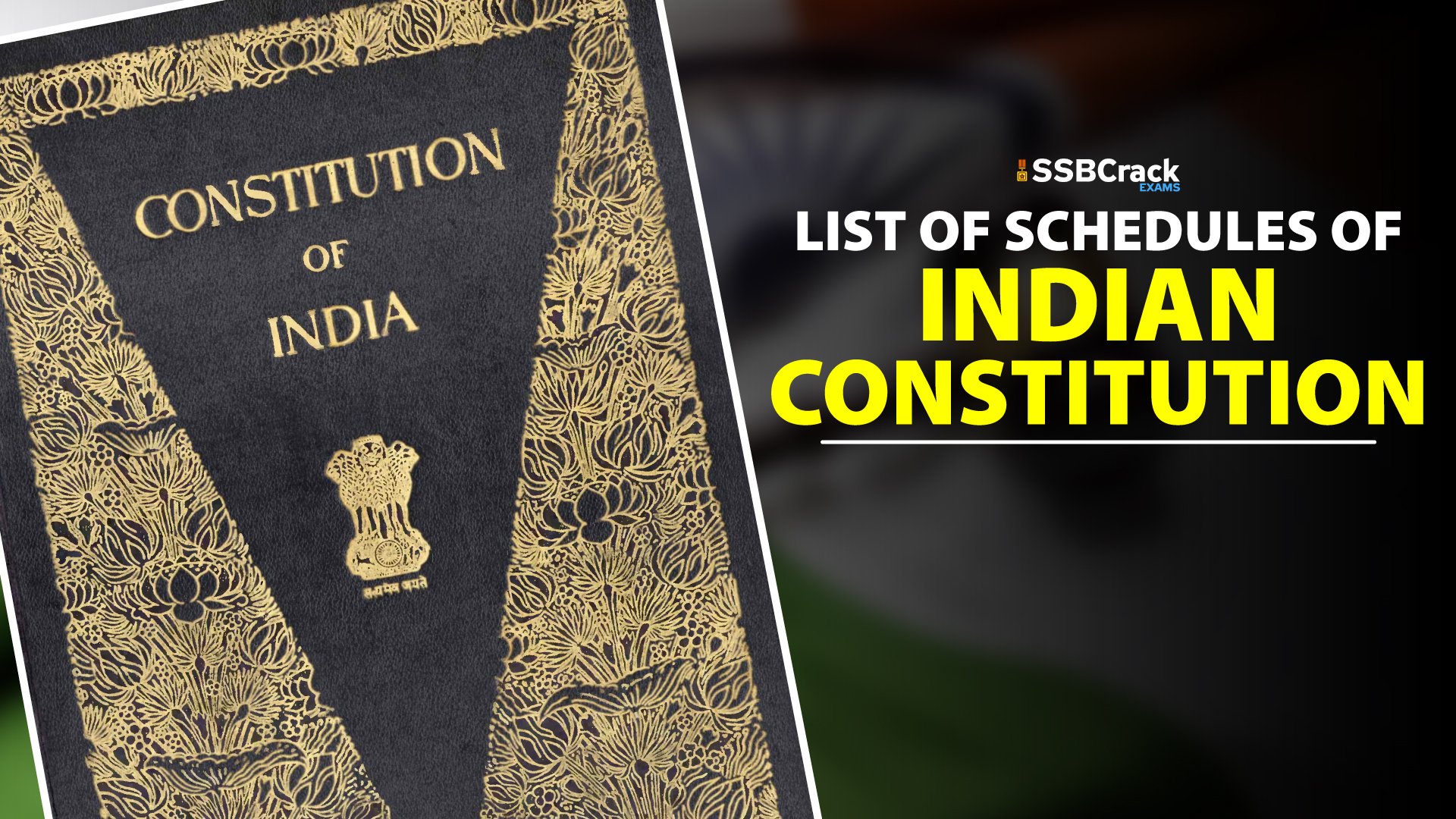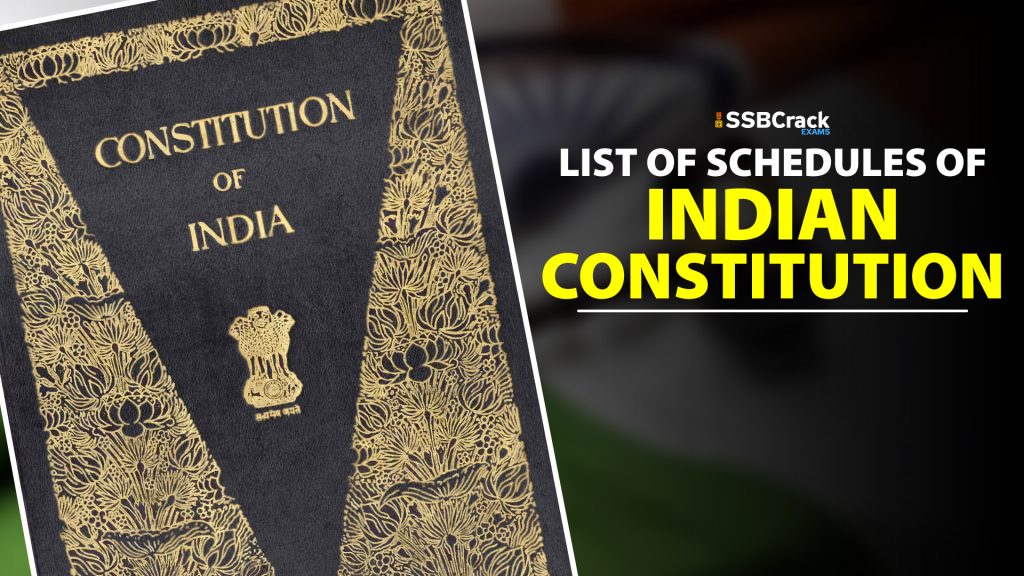Indian polity preparation is incomplete without studying the Indian constitution. It is the document that defines our democratic and progressive ideals. An important part of the constitution would be the 12 schedules.
Our constitution
India’s Constitution is the world’s longest, describing the foundation for political ideals, procedures, and the powers of government authorities. The Indian Constitution was drafted on November 26, 1949, and took effect on January 26, 1950. The creation of the Constitution took a total of 166 days, stretched out across two years, eleven months, and eighteen days. The Indian Constitution combined some of the most important characteristics of the British, Irish, Swiss, French, Canadian, and American constitutions. When compared to these countries, our constitution holds the fine balance between rigidity and flexibility.
Schedules
The constitution contains schedules that classify and organise bureaucratic work and government policies. They are essentially tables that include information not found in the articles. There were initially eight schedules in the Indian Constitution. Different amendments added four additional schedules, so at present, we have 12 schedules in the Indian constitution. We present you, the list of 12 schedules in the Indian constitution
| Schedule | Content/Feature |
| First Schedule | Lists the states and territories of India (also about their changes) |
| Second Schedule | Lists the salaries of officials holding public office, Presidents, judges, and Comptroller and Auditor General of India |
| Third Schedule | Forms of oaths and Affirmations of offices for elected officials including judges |
| Fourth Schedule | Allocation of seats in the Rajya Sabha (the Upper House of Parliament) per State or Union Territory |
| Fifth Schedule | Provisions as to the Administration and Control of Scheduled Areas and Scheduled Tribes |
| Sixth Schedule | Provisions as to the Administration of Tribal Areas in the States of Assam, Meghalaya, Tripura, and Mizoram |
| Seventh Schedule | The Union (central government), state, and concurrent lists of responsibilities |
| Eight Schedule | Languages recognised by the constitution. |
| Ninth Schedule | Validation of certain Acts and Regulations |
| Tenth Schedule | Anti-defection provisions for the Members of Parliament and the Members of the State Legislatures |
| Eleventh Schedule | Panchayat Raj (rural local government) |
| Twelfth Schedule | Municipalities (urban local government) |
Complete Schedules and Its Features
| Schedule | Subject Dealt |
| First Schedule | Lists the States name and their territorial jurisdiction |
| Lists the Union Territories name and their territorial extent. | |
| Second Schedule | It deals with the provisions relating to the emoluments, allowances and privileges of: |
| The President of India | |
| The Governors of Indian States | |
| The Speaker and the Deputy Speaker of Lok Sabha | |
| The Chairman and the Deputy Chairman of Rajya Sabha | |
| The Speaker and the Deputy Speaker of the State Legislative Assemblies | |
| The Chairman and the Deputy Chairman of the State Legislative Assemblies | |
| The Judges of the Supreme Court | |
| The Judges of the High Court | |
| The Comptroller and Auditor General of India | |
| Third Schedule | It consists of the forms of oath or affirmations for: |
| The Union Ministers | |
| The Candidates of Parliamentary elections | |
| Members of the Parliament | |
| The Judges of the Supreme Court | |
| The Comptroller and Auditor General of India | |
| The State Ministers | |
| The Candidates of State Legislature elections | |
| Members of the State Legislature | |
| The Judges of the High Court | |
| Fourth Schedule | It deals with provisions related to allocation of seats in the Rajya Sabha to the States and Union Territories |
| Fifth Schedule | It consists of the provisions related to the administration and control of scheduled areas and scheduled tribes in India |
| Sixth Schedule | This schedule deals with the provisions related to the administration of tribal areas in the states of |
| Assam | |
| Meghalaya | |
| Tripura | |
| Mizoram | |
| Seventh Schedule | It consists of three lists which divide the power between the Union and the States. |
| List I – Union List | |
| List II – State List | |
| List III – Concurrent List | |
| Eighth Schedule | It consists of a list of 22 Indian languages which are recognized by the Indian Constitution |
| Assamese | |
| Bengali | |
| Bodo | |
| Dogri (Dongri) | |
| Gujarati | |
| Hindi | |
| Kannada | |
| Kashmiri | |
| Konkani | |
| Mathili (Maithili) | |
| Malayalam | |
| Manipuri | |
| Marathi | |
| Nepali | |
| Oriya | |
| Punjabi | |
| Sanskrit | |
| Santhali | |
| Sindhi | |
| Tamil | |
| Telugu | |
| Urdu | |
| Ninth Schedule | The acts and regulations passed by the State Legislatures related to land reforms and abolition of Zamindari system are described under this schedule. |
| The acts and regulations of Parliament dealing with other matters are also dealt in this schedule. | |
| Tenth Schedule | It deals with the provisions related to anti defection law i.e. the members of Parliament and State Legislature can be disqualified on the ground of defection. |
| Eleventh Schedule | 29 matters related to the power, authority and responsibilities of Panchayats are described in this Schedule. |
| Twelfth Schedule | 18 matters related to the power, authority and responsibilities of Municipalities are described in this Schedule. |
Schedules and respective articles covered
| Schedules | Articles Covered |
| First | Articles 1 and 4 |
| Second | Articles 59, 65, 75, 97, 125, 148, 158, 164, 186 and 221 |
| Third | Articles 75, 99, 124, 148, 164, 188 and 219 |
| Fourth | Articles 4 and 80 |
| Fifth | Article 244 |
| Sixth | Articles 244 and 275 |
| Seventh | Article 246 |
| Eighth | Articles 344 and 351 |
| Ninth | Article 31-B |
| Tenth | Articles 102 and 191 |
| Eleventh | Article 243-G |
| Twelfth | Article 243-W |
Conclusion
The schedule’s goal is to simplify the act’s provisions by isolating the legal element from the extra information, making it more concise and easier to read. The schedule is used in a number of legislations for various reasons, not simply in the Indian Constitution. It’s used to make a list of states and union territories, as well as a list of additional subjects that come within the state’s, the unions, or both’s authority. It may be used for a number of purposes depending on the demands of the legislation. When a certain portion or piece of legislation requires extra explanation, schedules might be used. If this leaves you curious, check out our other articles on Indian polity. We break down different topics for defence aspirants, offering concise information and 360 degree analysis. Good luck with your preps.
Also Read:








